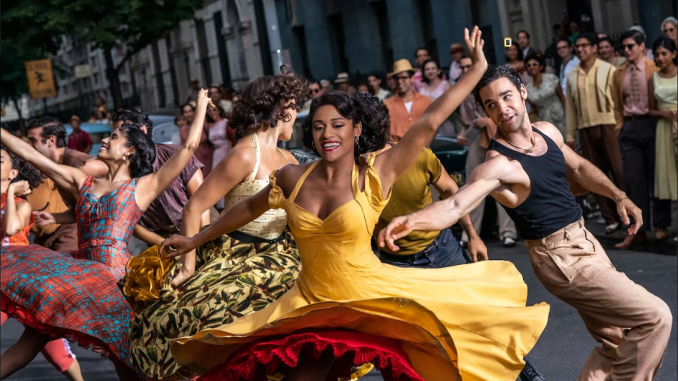
By Gabriela Flores
Since “West Side Story” hit theaters last December, film critics, audiences, and those who contributed to the film like Dr. Ernesto R. Acevedo-Muñoz, who served on the film’s Community Advisory Board as a historical consultant, have praised several aspects of the readaptation. Last Tuesday, Feb. 22, Acevedo-Muñoz shared his afterthoughts on the film, from its box-office bomb to the significance that “West Side Story” plays in American cinema.
“The story continues to evolve with all the problems and corners of the 1950s, but the core of the story is just as relevant today as it was in 1961, as it was in 1957. I think we’re not done,” Acevedo-Muñoz said.
Acevedo-Muñoz previously spoke in the Puerto Rican and Latino Studies Department’s ongoing lecture series “West Side Story: The Brooklyn Connection.” During his first virtual visit, Acevedo-Muñoz delved into the conscious decisions Director Steven Spielberg and others made in their telling of the 1957 Broadway musical, which centers around two rival gangs – the Sharks and Jets – fighting for New York’s Upper West Side during the 50s.
In his latest conversation with PRLS Deputy Chair María Pérez y González and Brooklyn College Professor Emerita Dr. Virginia Sánchez Korrol, Acevedo-Muñoz discussed what sets WSS apart from other musicals – starting with the 1961 film adaptation whose songs became part of his childhood home’s soundscape.
“I knew there was something special about ‘West Side Story’ in terms of its visual and sound design,” said Acevedo-Muñoz, who authored “West Side Story as Cinema: The Making and Impact of an American Masterpiece.”
Unlike classic Hollywood musicals that end in fairytale endings, where the “heterosexual coupling” ends up together one way or another, the finale of ‘West Side Story’ is an exception, Acevedo-Muñoz explained. The musical’s leading couple, Maria (Rachel Zegler) and Tony (Ansel Elgort), have a tragic ending within Spielberg’s version and its preceding ones, where a fatal bullet shot inevitably ends the young love.
“That was a departure that deserved attention, and part of the reason, and one of the things that make ‘West Side Story’ stand out not just visually, but also in terms of its narrative experience – that their music and song don’t resolve their conflicts,” he said.
With their conscious effort to “get it right,” Spielberg, screenwriter Tony Kushner, and others leading the 2021 adaptation set out to keep the key components that defined ‘West Side Story’ while also remaining as authentic as possible.
The newest ‘West Side Story’ allowed for more representation on the big screen with the help of historical consultants like Acevedo-Muñoz and Professor Sánchez Korrol, whose responsibilities included aiding those playing Puerto Rican characters with their accents. Noticeably to Acevedo-Muñoz, Anita (Ariana DeBose) and Maria are two “cutting-edge characters” who spoke their minds along the “confines of a 1950s context.”
“We cannot forget that the storytime is the late 1950s. There are some attitudes and expectations in terms of gender roles [that] if we change them from what they were generally in the 1950s we’d be just fantasizing,” said Acevedo-Muñoz.
Another significant change within the 2021 plot was the development of Anybody (iris menas), a transgender character that was previously treated as “a caricature” within the 1961 adaptation of ‘West Side Story.’ Screenwriter Kushner, Acevedo-Muñoz described, transformed Anybody “with depth, with intelligence, and bravery” to assert their identity despite the hostility they face. Nonetheless, despite these efforts to ensure different groups included in the story are accurately represented, Acevedo-Muñoz notes that ‘West Side Story’s’ latest debut might have room to improve.
“All fiction is flawed when it comes to representing something. Otherwise, it wouldn’t be fiction – it’d be reality,” he said. “[…] Can they do something better? I’m sure they can. And I’m sure in a few years from now we might be looking back and saying, ‘Aha, there’s something they could’ve done better.’”
As ‘West Side Story’ draws awards and universal acclaim from different realms of the industry, Acevedo-Muñoz noted that most recognition is going towards “technical categories,” including cinematography, sound, and production design. In comparison to the 1961 film, which brought in $44 million at the box office with a $6 million budget, Spielberg’s production cost around $100 million with only a $77 million box office turnout. When adjusting the box office receipts for inflation, Acevedo-Muñoz explained, the latest WSS was outgrossed by its 1961 predecessor.
“And this is one of the disappointments that the producers and distributors at Disney are going to be scratching their heads about as we’re moving into the Oscars,” he said, mentioning earlier the 2021 film will be streaming on Disney+ soon. “To put it bluntly, the asses on the seats did not materialize.”
With the Oscar Awards nearing, screenwriter Kushner has received minimal recognition this award season in comparison to his ‘West Side Story’ colleagues, which concerned Professor Sánchez Korrol and others who admired his screenplay. Acevedo-Muñoz explained that given the musical has already been produced before, it’s difficult for any screenwriter to receive accolades for their reimagined work. Though the growing world of streaming and bootlegging may have impacted the number of theater-goers, Acevedo-Muñoz noted the low box office turnout might determine how many awards WSS receives overall.
“The politics of the Oscars are a great mystery to us looking from the outside in,” Acevedo-Muñoz said. “If ‘West Side Story’ had been a smash box office hit, I suspect that the odds would have been different as well.”
